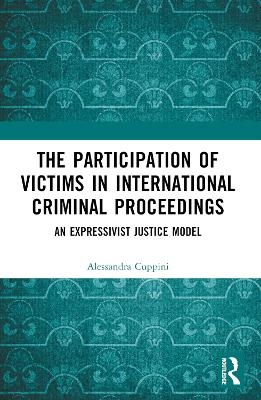
The Participation of Victims in International Criminal Proceedings
Routledge (Verlag)
978-1-032-10463-8 (ISBN)
This book argues that the expressivist justice model provides a meaningful foundation for the participation of victims in international criminal proceedings.
Traditional criminal justice theories have tended to marginalise the role afforded to victims while informing the criminal procedures utilised by international criminal courts. As a result, giving content to, shaping, and enhancing victims’ participatory rights have been some of the most debated issues in international criminal justice. This book contributes to this debate by advancing expressivism, which has the capacity to create a historical narrative of gross human rights violations, as a core of international criminal justice able to provide a worthwhile basis for the participation of victims in proceedings and clarifying the scope and content of their participatory rights. The work provides an in-depth discussion on issues related to victims’ participatory rights from the perspective of international human rights law, victimology, and the philosophical foundation of international criminal justice.
The book will be a valuable resource for researchers, academics, and policymakers working in the areas of international criminal justice, international human rights law, transitional justice, and conflict studies.
Alessandra Cuppini holds a senior postdoctoral fellowship awarded by the Research Foundation Flanders Grant (FWO) to conduct research at the Programme for Studies on Human Rights in Context of Ghent University. She previously worked as an Associate Lecturer at the Open University and as teaching assistant at the University of Strathclyde where her research was funded by Campbell Burns scholarship. Her academic experience includes research stays at the University of Barcelona and the University of Maastricht. Her current research looks at narrative victimology in international criminal justice.
1. Introduction 2. Victims’ status under theories of criminal justice: A critical perspective 3. Arguments for a change of paradigm in international criminal justice: Shortcomings of the retributive, utilitarian, and restorative models of justice 4. Expressivism: A philosophical foundation for international criminal justice 5. The expressivist dimension of victims’ participation in international criminal proceedings: Harmonising the adversarial and inquisitorial systems 6. A lesson from the regional human rights courts: An expressivist underpinning for victims’ right to participate in criminal proceedings 7. Victims before the Nuremberg IMT, the ICTY, and the ICTR: An expressivist deficit8. Expressivism and the participatory rights of victims before the International Criminal Court 9. Conclusions
| Erscheinungsdatum | 05.10.2022 |
|---|---|
| Verlagsort | London |
| Sprache | englisch |
| Maße | 156 x 234 mm |
| Gewicht | 453 g |
| Themenwelt | Recht / Steuern ► Allgemeines / Lexika |
| Recht / Steuern ► Arbeits- / Sozialrecht ► Sozialrecht | |
| Recht / Steuern ► EU / Internationales Recht | |
| Recht / Steuern ► Öffentliches Recht ► Verfassungsrecht | |
| Recht / Steuern ► Strafrecht ► Kriminologie | |
| Recht / Steuern ► Strafrecht ► Strafverfahrensrecht | |
| ISBN-10 | 1-032-10463-5 / 1032104635 |
| ISBN-13 | 978-1-032-10463-8 / 9781032104638 |
| Zustand | Neuware |
| Informationen gemäß Produktsicherheitsverordnung (GPSR) | |
| Haben Sie eine Frage zum Produkt? |
aus dem Bereich


